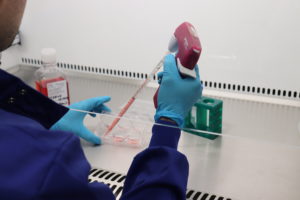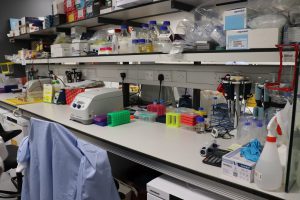PTEN: Finding the off switch
Project Summary
About the Researchers
Dr Jorge de la Rosa
Principal Investigator
Jorge is an associate principal investigator at the University of Cambridge, focussing on using complex genetic models and screening approaches to explore the mechanisms driving prostate cancer.
Alex Hart
Research Assistant
Alex is a research assistant and joined the project straight from a Master of Research degree at the University of Glasgow where she worked on a project looking at how genetics impacts cell signalling and immune cell movement in cancer.
The Problem with Genetics
There are two types of gene that are important in cancer: oncogenes which are like ‘on switches’ and tumour suppressor genes which are like ‘off switches’. The oncogenes tell cells to grow and make more copies of themselves. The tumour suppressor genes tell cells to stop growing and dividing, preventing cancer in healthy cells. These switches trigger chain reactions and exist as part of a complicated network, like the switches in a fuse box. When a normal cell turns into a cancer cell, it can sometimes be hard to work out which switch has tripped.


The Mystery of PTEN
PTEN is an 'off switch' which doesn’t work properly in almost all advanced prostate cancers.
Despite this, we still don’t know the best way to target these cancers due to the complicated network of genetic ‘switches’. Cancer is a very complex disease and PTEN is not working alone.
Very little is known about the other changes that happen at the same time that PTEN is lost. Science is currently identifying genetic changes much more quickly than we can work out what these genetic changes do. Therefore, we don’t understand how PTEN loss and other changes or ‘switches’ inside the cell work together to drive the growth and spread of prostate cancer.
Prostate Cancer Research funded researcher Dr Jorge de la Rosa talks about his work exploring the genetics behind prostate cancer.
Jorge's Research Project
Jorge will create a new in vivo genetic tool which can be used to alter hundreds if not thousands of genes at once. This tool will be used to identify the other genetic changes that occur when PTEN is lost. Once these changes have been identified, Jorge will explore what they do and how they work with a faulty PTEN to drive prostate cancer.
A model system will also be developed as part of Jorge’s research. This model system will imitate the complicated genetic networks behind prostate cancer much better than previous models. This means it can used to test new treatments for prostate cancer patients and identify those that are more likely to be effective with fewer side effects.

Jorge is identifying the genes that normally stop PTEN-deficient prostate cancers from spreading.
He aims to understand how and why changes to these genes lead to the spread of prostate cancer. These genes could be used to diagnose the severity of the disease and decide on the best treatment options for patients. For example, some gene changes may only be found in advanced prostate cancer tumours. Identifying these changes in patients could establish which patients need immediate treatment and which patients can avoid unnecessary treatment.
Jorge will also search for genetic weaknesses of these cancers: genes that prostate cancer cells need to survive but healthy cells don’t.
This will then tell him which genes could be targeted by new treatments to attack prostate cancer cells without harming healthy cells. These treatments could eventually lead to better outcomes for patients with advanced prostate cancer.
““We aim to identify and understand the faulty genes that cause human prostate tumours to spread, and eventually find the “vulnerabilities” of these disseminated cancers. I am very grateful to PCRC and I feel very excited about this work, which I hope will bring new prognostic and therapeutic opportunities for people with prostate cancer.”
Dr Jorge de la Rosa
University of Cambridge








